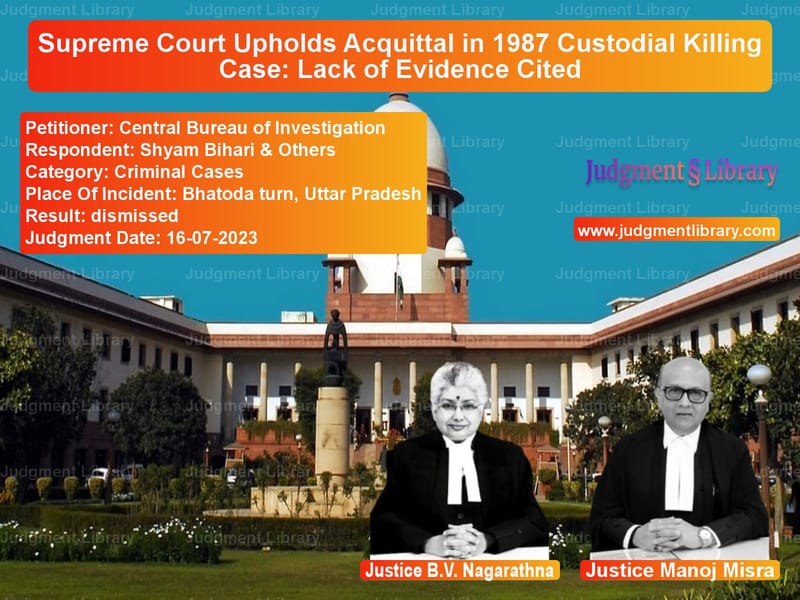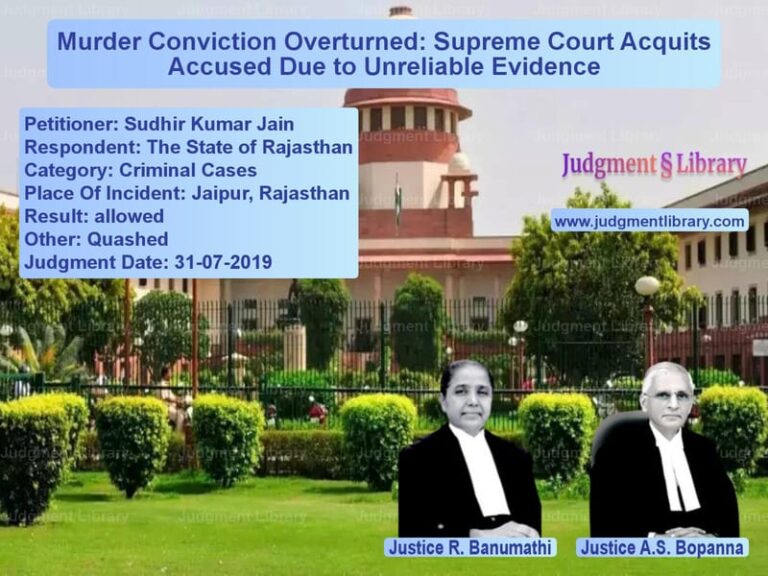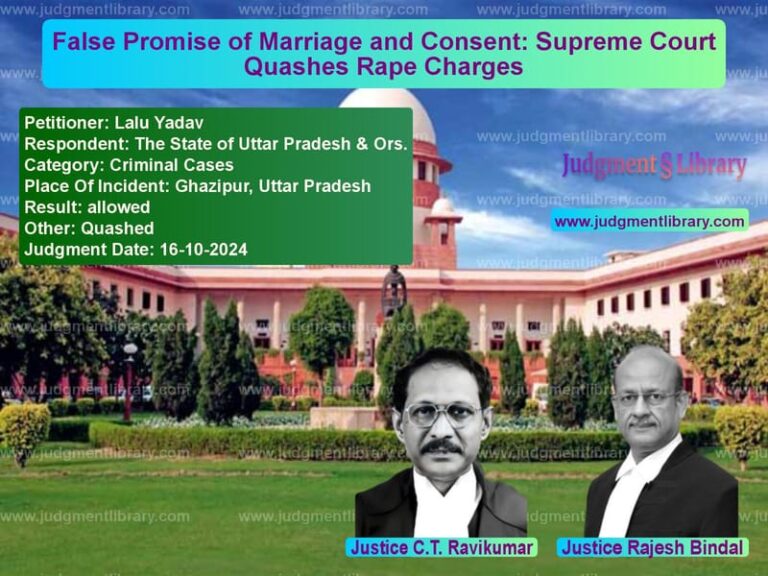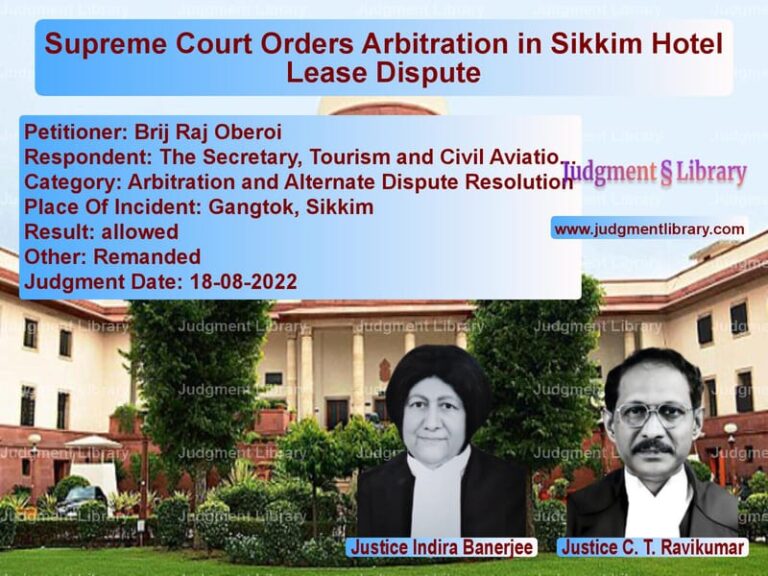Supreme Court Upholds Acquittal in 1987 Custodial Killing Case: Lack of Evidence Cited
The case of Central Bureau of Investigation v. Shyam Bihari & Others concerns a controversial custodial killing that occurred in 1987. The Supreme Court upheld the acquittal of three police constables accused of killing a man named Raj Kumar Baliyan, citing insufficient evidence to establish their guilt beyond reasonable doubt.
Background of the Case
The case dates back to the night of June 24, 1987, when Raj Kumar Baliyan was shot and killed near Bhatoda turn in Uttar Pradesh. Two conflicting versions of the incident emerged:
- First FIR (Case Crime No. 48/87): Filed by Pramod Kumar Tyagi (PW-6), alleging that three policemen stopped them, flashed a torchlight, and fired at Baliyan.
- Second FIR (Case Crime No. 48A/87): Lodged by Mahindra Singh, claiming that Baliyan was mistaken for a criminal and shot during an encounter.
The case was initially investigated by CB-CID but was later handed over to the Central Bureau of Investigation (CBI). After its probe, the CBI charged three constables—Shyam Bihari, Anil Kumar Sharma, and Arshad Ali—under Section 302 read with Section 34 IPC.
Trial Court’s Verdict
The Special CBI Court, Dehradun, acquitted all three accused on December 13, 2011, citing the following reasons:
- Eye-witnesses failed to identify the accused: PW-3 and PW-6, who were present at the scene, admitted they had never seen the accused before and did not identify them in court.
- Unreliable testimony of PW-15: The alleged eyewitness, Shyam Singh, did not immediately report what he had seen. Instead, he submitted an affidavit days later, raising doubts about its authenticity.
- Ballistic evidence was inconclusive: While some empty rifle cartridges at the scene matched the service rifles of the accused, the autopsy revealed that Baliyan was shot with a .12 bore weapon, which none of the accused possessed.
- Cross-FIR suggested an alternate version: The second FIR (48A/87) filed by villagers suggested that the police fired in self-defense after being shot at by suspected criminals.
High Court’s Decision
The Uttarakhand High Court dismissed the government’s appeal against acquittal on July 26, 2012. The court noted:
- The prosecution’s case was based on unreliable witnesses.
- The medical evidence contradicted the claim that the accused fired the fatal shot.
- The benefit of doubt must go to the accused in cases of conflicting evidence.
Arguments Before the Supreme Court
CBI’s Arguments
The Additional Solicitor General argued:
- The accused were on patrolling duty at the crime scene on the night of the incident.
- Empty cartridges recovered at the scene were fired from their service rifles.
- The case should not have been dismissed solely based on witness credibility.
- Even if PW-3 and PW-6 failed to identify the accused, PW-15’s testimony should have been given more weight.
Respondents’ Arguments
The defense, representing the accused, countered:
- PW-3 and PW-6, the primary witnesses, never identified the accused.
- PW-15’s testimony was unreliable as he only came forward with an affidavit days later.
- The autopsy confirmed that the fatal shot came from a .12 bore weapon, which was not issued to any of the accused.
- There was no direct evidence linking the accused to the crime.
Supreme Court’s Findings
A bench comprising Justices B.V. Nagarathna and Manoj Misra upheld the acquittal, emphasizing the need for clear and convincing evidence.
Key Observations
1. Witness Testimony Was Unreliable
“Neither PW-3 nor PW-6 could identify the accused, and PW-15’s affidavit was prepared under suspicious circumstances.”
2. The Prosecution’s Case Was Inconsistent
“Some of the empty cartridges found at the scene did not match the rifles issued to the accused, raising doubts about the accuracy of the investigation.”
3. Medical Evidence Contradicted the Prosecution’s Claim
“The post-mortem report confirmed that the deceased was killed by a .12 bore gunshot, which the accused did not possess.”
4. Benefit of Doubt Should Go to the Accused
“If there is reasonable doubt about the guilt of the accused, the court must rule in their favor.”
Final Verdict
The Supreme Court dismissed the CBI’s appeal, stating:
“In such a situation, there was no option for the trial court but to extend the benefit of doubt to the accused.”
The accused were acquitted and their bail bonds discharged.
Impact of the Judgment
This ruling has several legal implications:
- Strengthens the standard of proof: The case highlights the importance of direct evidence in securing a conviction.
- Limits reliance on unreliable witnesses: Courts must scrutinize affidavits filed after significant delays.
- Emphasizes the role of forensic evidence: A mismatch between the weapon used and the accused’s issued weapons played a crucial role in the acquittal.
- Protects against wrongful convictions: The judgment reiterates that mere suspicion is not enough to convict.
Conclusion
The Supreme Court’s decision in CBI v. Shyam Bihari underscores the principle that convictions must be based on strong, reliable evidence. This ruling serves as an important reminder that in criminal cases, the prosecution must prove guilt beyond reasonable doubt, ensuring justice is served fairly.
Petitioner Name: Central Bureau of Investigation.Respondent Name: Shyam Bihari & Others.Judgment By: Justice B.V. Nagarathna, Justice Manoj Misra.Place Of Incident: Bhatoda turn, Uttar Pradesh.Judgment Date: 16-07-2023.
Don’t miss out on the full details! Download the complete judgment in PDF format below and gain valuable insights instantly!
Download Judgment: central-bureau-of-in-vs-shyam-bihari-&-other-supreme-court-of-india-judgment-dated-16-07-2023.pdf
Directly Download Judgment: Directly download this Judgment
See all petitions in Custodial Deaths and Police Misconduct
See all petitions in Bail and Anticipatory Bail
See all petitions in Murder Cases
See all petitions in Attempt to Murder Cases
See all petitions in Judgment by B.V. Nagarathna
See all petitions in Judgment by Manoj Misra
See all petitions in dismissed
See all petitions in supreme court of India judgments July 2023
See all petitions in 2023 judgments
See all posts in Criminal Cases Category
See all allowed petitions in Criminal Cases Category
See all Dismissed petitions in Criminal Cases Category
See all partially allowed petitions in Criminal Cases Category







